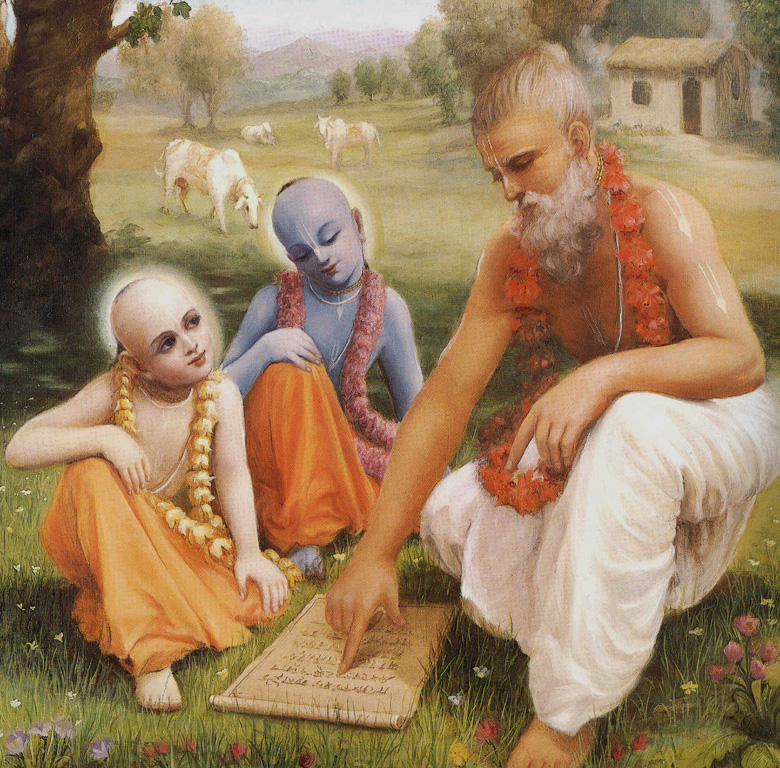Question: Scriptures explain the Siksa Guru and Diksa Guru should be treated equally. It is also said Paramatma himself comes as our Guru to guide a sincere seeker in Spiritual Life. Reading many such statements I get confused.
Question1) We may have so many Siksa Gurus who are also seekers like us and may not be pure devotees. Should they be treated as such especially while following orders or we must use discretion while following them?
Answer 1 by Romapada Swami:
According to vaisnava teachings, there are two equally respected kinds of guru – diksa guru or initiating spiritual master, and siksa guru or instructing spiritual master.
Your mentors or counselors or guides, while they perform a very important role in your life, are often *NOT* to be taken in the same Absolute sense as one’s diksa guru or siksa guru is to be honored.
A siksa guru instructs a devotee either in consultation with the diksa guru or along the general guidelines given by Guru, sadhu and sastras.
Also, although there may be more than one siksa guru in one’s life, many times there is one most prominent senior (in terms of spiritual advancement) siksa guru from whom a devotee receives ongoing instructions, guidance and encouragement to further progress in one’s devotional practice.
In Bhakti Sandarbha Anuchheda 210, Jiva Goswami makes the distinction between a paramärtha-guru (a guru whose capacity is to give his disciple the ultimate goal of life) and a vyavahärika-guru (conventional or guru by custom)
Another important point is that the role siksa guru will play in a devotee’s life will depend on individual circumstances – the faith of the devotee in taking guidance from his/her siksa guru, the motivation to advance in one’s spiritual life, and the conviction in the heart that one is receiving the right guidance from the siksa guru to progress. Ones relationship with a siksa guru – when based on genuine qualification, faith and respect – plays a very important role.
It is not healthy to consider the Siksa gurus on the same platform of advancement as us. While they may not be uttama adhikari devotees, they are definitely more advanced than us and therefore should be respected appropriately.
Question2) Similarly, for a Diksa guru – especially in an organizational structure like ISKCON – different gurus might have different levels of realization. Should we treat all of them as pure devotees if the management has allowed them to give initiation?
Answer 2 by Romapada Swami:
The symptoms of the bona fide spiritual master are stated in Srimad-Bhagavatam (11.3.21):
tasmād guruṁ prapadyeta
jijïāsuḥ śreya uttamam
śābde pare ca niṣṇātaṁ
brahmaṇy upaśamāśrayam
“Any person who is seriously desirous of achieving real happiness must seek out a bona fide spiritual master and take shelter of him by initiation. The qualification of a spiritual master is that he must have realized the conclusion of the scriptures by deliberation and arguments and thus be able to convince others of these conclusions. Such great personalities, who have taken complete shelter of the Supreme Godhead, leaving aside all material considerations, are to be understood as bona fide spiritual masters.”
Question 3) Should all gurus be seen only as devotees who are much more advanced than us and hence can provide better guidance, we may still worship them and take their guidance but then does the ‘saksad hari principle applies.’
Because of my own condition nature and fault finding, I may start finding faults in all such gurus. Thus, I try to present a humble inquiry to make better decisions in the future. Please guide.
Answer 3 by Romapada Swami:
While the language of your question is unclear, below is part of a Lecture on BG 7.9 — Vrndavana, August 15, 1974 by Srila Prabhuapda:
“One who is pure devotee, he’s empowered by Kṛṣṇa to act as spiritual master. Therefore, spiritual master should be accepted: sākṣād-dharitvena samasta-śāstrair uktaḥ. It is described there. Tathā bhāvyata eva sadbhiḥ. Those who are learned scholars, actual devotees, they accept. But that does not mean guru is Kṛṣṇa. Kintu prabhor yaḥ priya eva tasya. Now, that, if you accept, you… Accept means you honor spiritual master as good as Kṛṣṇa, because he’s representative. But not that Māyāvāda philosophy that guru and Kṛṣṇa is the same. This is simultaneously one and different. Kintu prabhor yaḥ priya eva tasya. He is as good as Kṛṣṇa because he is very, very dear to Kṛṣṇa. Why dear? Because he’s preaching on behalf of Kṛṣṇa. What Kṛṣṇa wants, he’s doing that. Therefore, he’s very dear.”







